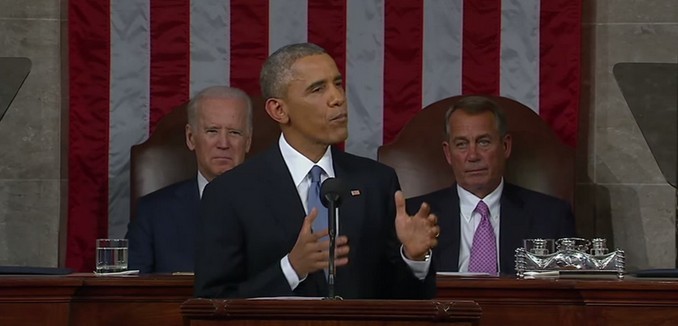President Barack Obama’s claims in his State of the Union Address Tuesday night have earned the president “Three Pinocchios” for inaccuracies, The Washington Post’s fact-checker, Glenn Kessler, wrote today.
Kessler consulted with a number of experts about Obama’s claim that, “our diplomacy is at work with respect to Iran, where, for the first time in a decade, we’ve halted the progress of its nuclear program and reduced its stockpile of nuclear material.” Specifically, Kessler focused on the words “halted” and “reduced” as used in this context.
Olli Heinonen, who headed the IAEA’s safeguards section during the 2003-2005 talks between Iran and three European powers (United Kingdom, France and Germany), said “it is true that 20-percent enriched uranium stocks have decreased, but Iran is still producing uranium enriched up to 5-percent uranium. The latter stocks have actually increased when you talk about stocks of UF6 [uranium hexaflouride] and other chemical compounds.”
Moreover, while there has been no installation of new centrifuges, “it appears that the production of centrifuge components continues. Same with the Arak reactor. No new nuclear components have been installed, but it does not mean that the production of those came to halt.”
As Heinonen put it, “the JPOA is just a step to create negotiation space; nothing more. It is not a viable longer term situation. The nuclear caravan of Iran continues and sets a step after a step another fait accompli.”
Heinonen’s response reveals that the amount of nuclear materials that could be enriched to weapons grade have increased. Moreover, Iran’s enrichment program and construction of its heavy-water reactor have continued apace.
In practical terms, David Albright of the Institute for Science and International Security told Kessler that over the course of the Joint Plan of Action (JPOA) Iran has increased its stocks with “about a bomb’s worth” of additional nuclear material.
Kessler concludes:
Words have consequences, especially in a State of the Union address. The president could have claimed that “we’ve slowed the progress of its nuclear program and reduced its stockpile of the most dangerous nuclear material.” But instead he choose to make sweeping claims for which there is little basis. Thus he earns Three Pinocchios.
In How a Weak Iran Deal Makes Us All Less Safe and War More Likely, which was published in the January 2014 issue of The Tower Magazine, Emanuele Ottolenghi warned:
Similar to the sanctions easing, the interim deal has fatally undermined the NPT by watering down Iran’s compliance obligations, undercutting the IAEA’s authority in matters of verification, and ignoring the military dimensions of the program documented by the Agency, which are all at the heart of the dispute. In fact, if a final agreement were to emerge that fails to address the flaws present in the interim deal, including continued enrichment work, Iran would be able to break out under the cover of the NPT.
[Photo: Washington Post / YouTube ]




